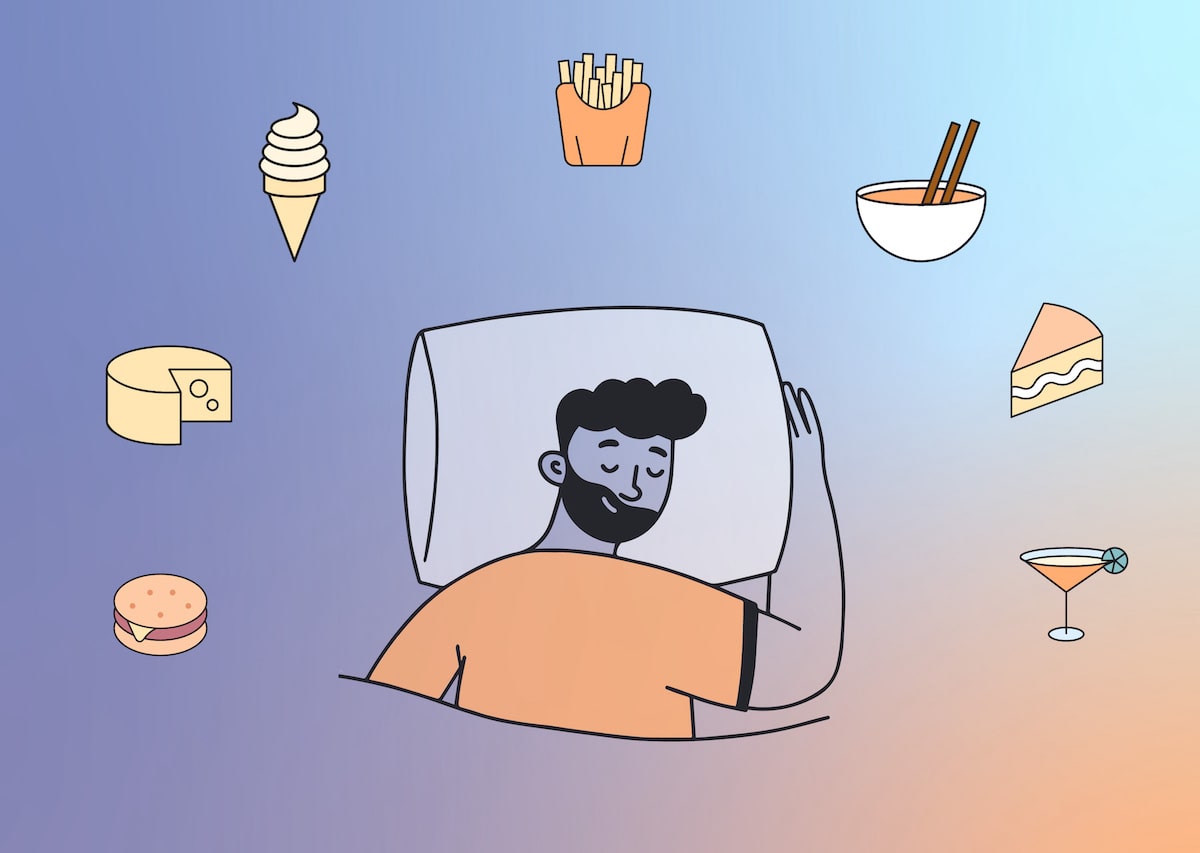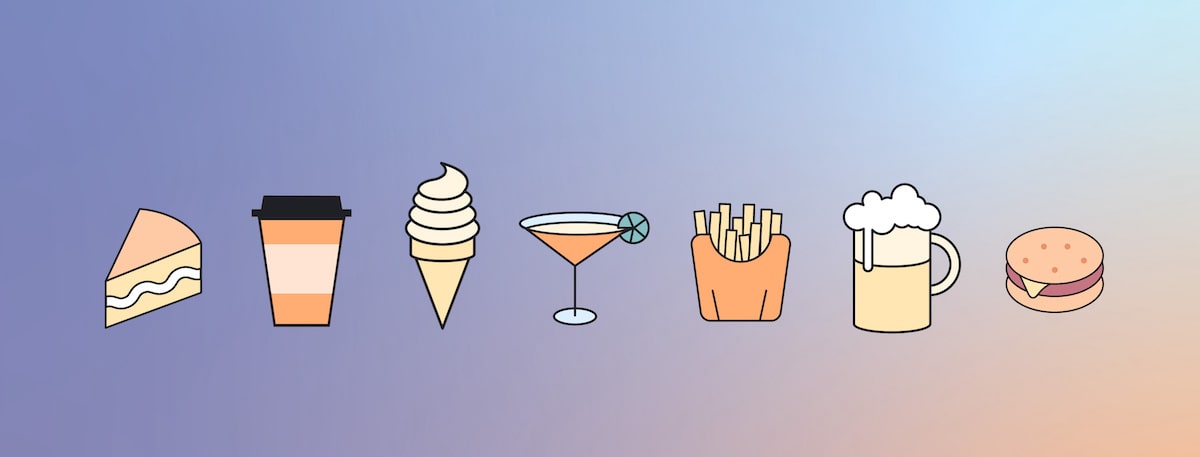Metabolism and sleep are closely related. The timing of your last meal or snack of the day can have an effect on your sleep. The types of foods or beverages you consume can promote or inhibit proper rest. Something as simple as timing food intake or eating specific foods may have a major impact on your daily sleep cycles.
This article will unpack many of the nuanced opinions on whether eating before bed is good or bad, dispel any myths or misunderstandings about eating before bed, and shed light on what foods you should embrace or avoid when it comes to getting a better night’s sleep. Let’s take a look at some pros and cons of eating before bed.

Is It Bad to Eat Before Bed?
Most nutritionists agree that leaving a three-hour window between dinner and bedtime is ideal. This time frame allows enough time for us to digest our food properly so that our sleep is not disturbed by the digestive process. Additionally, a three-hour window leaves a short enough gap between eating and hitting the hay so that we don’t go to bed feeling hungry, which can also be disruptive to our sleep. However, experts have mixed opinions on whether eating before bed is detrimental to our health.
Recent findings in a study from the Perelman School of Medicine at the University of Pennsylvania indicate that on-going periods of eating right before bed can negatively impact hormone markers in our body, which are linked to diabetes and cardiovascular disease by increasing weight, insulin, glucose, and cholesterol levels and by impairing fat metabolism.
It is important to note that for those individuals who suffer from metabolic disorders such as type 1 diabetes or glycogen storage disease (GSD), eating before bed is medically necessary and prevents nocturnal hypoglycemia.
Benefits of Eating Before Bed
Many experts believe eating before bed may cause inadequate sleep both in quantity and quality, along with other poor health outcomes such as weight gain, increased cholesterol, glucose and insulin. However, the scientific perspective has changed over the last few years and the benefits and drawbacks of eating before bed have become more nuanced.
We now understand that many of the studies that previously pointed to the negative outcomes of eating before bed were done with night shift workers, those with night eating syndrome (NES), or with individuals who were already obese and sleep deprived. And, similar to other collected health data, little research was done on healthy women until recently.
There is new mounting evidence that suggests that eating small amounts of nutrient dense, low-calorie, and specific single macronutrient food groups may not result in the same poor health outcomes that have been seen in those populations who eat large mixed meals consistently during the nighttime hours. In fact, low calorie, nutrient dense microsnacks before bed may be helpful for a number of reasons.
In fact, low calorie, nutrient dense microsnacks before bed may be helpful for a number of reasons.
- Some foods can help you sleep: Foods that are high in fiber, low in saturated fat, and low in sugar have been linked to more restorative sleep and less night-time arousals while sleeping. If you are hungry or sleep deprived, you may have more difficulty falling asleep.
- Blood sugar problems: Eating a nutritious microsnack that is low in sugar before bed could boost metabolism and help balance your blood sugar. This can prevent nighttime arousal, because the liver isn’t disturbed as it struggles to find more glucose.
- Metabolism: Going to bed hungry can lead to overeating the next day, while eating a small microsnack has been shown to help with morning hunger.
- Improved muscle mass: Not eating enough can also lead to malnutrition and loss of muscle mass. Eating small, nutrient-dense snacks before bed has been shown to increase protein synthesis in the cells which helps build muscle and is especially helpful for older adults as it inhibits the loss of skeletal muscle mass.
- Metabolic disorders: Those who have health issues such as type 1 diabetes, GSD, metabolic syndrome, pre-diabetes, and type 2 diabetes, should eat a small, high fiber, low fat and low sugar snack before bed to prevent nocturnal hypoglycemia.
Drawbacks of Eating Before Bed
Though eating before bed can have a number of positive outcomes, there are also potential drawbacks.
- Difficult digestion: Studies show that eating before bed can increase acid reflux, nighttime heartburn, and gastroesophageal reflux disease (GERD).
- Increased cravings: The later we eat at night, the more likely we are to make unhealthy food choices. Pizza, popcorn, ice cream, alcohol, and chocolate are common late night snack and drink choices. These same foods can give us a “fake” energy that will keep us awake longer, but can also interrupt our sleep or make it difficult for us to fall asleep.
- Weight gain: Multiple studies show that eating larger, mixed meals close to bedtime can increase cholesterol, fat, and insulin levels. A recent study from University of Pennsylvania suggests that if you eat later in the evening instead of earlier in the day, weight does increase, and the body has a reduced ability to metabolize fats instead of carbs.
What Should You Eat Before Bed for Better Sleep?
If you do need to eat before bed, you can make healthier choices that will positively impact your sleep.
- Eat lean protein and low sugar foods like fish, low fat cheese, chicken, and turkey. Lean protein snacks can help with protein synthesis while we sleep and help with morning hunger.
- Eat foods that are high in magnesium, like almonds, bananas, pumpkin seeds, leafy greens, and avocados. Studies have shown a link between low magnesium levels and sleep disorders.
- Eat high-tryptophan foods like cherry juice and milk, which have been shown to increase melatonin levels and help us sleep. Tart cherry juice, which is high in phytonutrients and is linked to increased tryptophan availability, has been found to increase melatonin and improve sleep efficiency and duration. Meanwhile, a systematic review of milk and dairy products’ effects on sleep showed that eating these foods could positively affect sleep quality.
- Eat blood sugar balancing foods. Beth English, a Registered Nutritional Therapist, suggests, “Brown rice, quinoa, whole grains, lentils, and beans are all great additions to your evening meal.” She says, “Glycogen stores in our liver deplete circa 3 a.m. and the alert hormone, cortisol, can rise in response. It may sound counterintuitive, but to encourage sleep throughout the night, try having a sensible portion (about 1/2 cup) of a good quality, complex carbohydrate with your evening meal. Try this smart carb strategy in partnership with good sleep hygiene to encourage deeper, restorative and uninterrupted sleep.”
RELATED: 12 Healthy Foods to Eat When You Want a Midnight Snack

Foods and Drinks to Avoid Before Bed
Studies show that some foods can negatively impact your sleep and are unhealthy for us to eat before bed.
- Avoid foods high in sugar or sodium, such as chips, cakes, cookies, chocolates, and candy.
- Avoid alcohol and caffeine, which can both spike blood sugar and create changes in the hormone cortisol that may keep us awake or disturb our sleep once we’ve nodded off.
- Avoid fried foods. Try to choose fries, onion rings, and chicken fingers earlier in the day. These fried foods are difficult to digest even in the best-case scenarios, and for those of us who suffer from GERD or acid reflux, the combination of fried foods, nighttime eating, and sleep can be disastrous.
- Don’t choose spicy foods right before bed. Hot sleepers and people who menstruate might experience night sweats because of hormone dysregulation, perimenopause, or menopause, and should stay away from spicy foods like chili peppers, which has been shown to increase our internal temperature even while we sleep. You may also want to invest in a high quality mattress protector that will prevent sweat from seeping into the mattress.
Tips for Eating Close to Your Bedtime
For most of us, sticking to a three-hour window between dinner and bedtime will help us get better quality sleep and feel well-rested in the morning. Oftentimes we may reach for that late-night meal because we haven’t eaten enough during the day, or we don’t follow a relaxing sleep hygiene routine at night.
You may find it helpful to follow consistent bedtimes and wake times — as well as regular mealtimes — to give your body much-needed stability. However, life does not always move in line with the routines that we create, so if you do find yourself having to eat close to bedtime, try to avoid eating heavy, spicy, or sugary meals, and steer clear of alcohol and caffeine before you go to bed.
Another healthy and satiating option is lean protein like chicken or turkey. Alternatively, you can reach for a handful of almonds or pumpkin seeds and a small glass of tart cherry juice, which will simultaneously boost your magnesium and promote melatonin production for a good night sleep. Either way, go for a small snack instead of a large mixed meal and you’ll be well-rested in the morning.
Final Thoughts
Research shows that leaving a three-hour window between dinner and bedtime is best for most of us, unless we suffer from a metabolic disorder like type 1 or type 2 diabetes, GSD, or nocturnal hypoglycemia.
If you haven’t eaten enough during the day and you are hungry at bedtime, having a microsnack like low-fat cheese or lean protein like chicken or turkey can help to balance blood sugar levels. This has been clinically shown to help sleep, since spikes in blood sugar can potentially wake us up. This type of healthy snacking can also keep us satiated longer the next day. If you’re having trouble falling asleep, reach for the tryptophan-high tart cherry juice or the classic cup of warm milk, which have both been shown to increase melatonin and help us sleep.
FAQs
Is it bad to go to bed hungry?
If you’d like to have a good night’s sleep, don’t go to bed hungry. Going to bed hungry can cause interrupted sleep and can make us eat more the next day.
Why do I get hungry at night?
We often get hungrier at night because we haven’t eaten enough during the day. Sleep deprivation also makes us hungrier at night. Research shows that when we haven’t slept enough, we crave calories and our brains have more difficulty deciphering between high calorie, fatty foods versus low calorie, more healthful foods.
What should I eat before bed to lose weight?
Eating a lean protein snack before bed has been shown to help with protein synthesis and keep us more satiated in the morning hours which can help us to lose weight.
How long before bed should you stop eating?
Research shows that leaving a 3-hour window between dinner and bedtime is best for most of us, unless you suffer from diabetes or GSD.
How do I stop getting hungry at night?
Try to choose nutrient rich and well-balanced meals at consistent times during the day. It can also help to work on your sleep hygiene habits, including going to bed and waking up at the same times each day, using blackout curtains, and shutting off electronics at least 30 minutes before bedtime.
